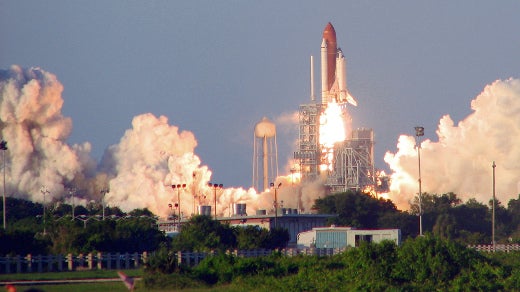If 2011 becomes known as the year that our governments lost interest in space, could 2012 be the year that collaboration picks up the pieces?
As of this week, the Allen Telescope Array used by the SETI Institute has gone into "hibernation mode" after losing a significant portion of its funding. "Hibernation means that, starting this week, the equipment is unavailable for normal observations and is being maintained in a safe state by a significantly reduced staff," said SETI Institute CEO Tom Pierson.
Although the array itself is hibernating, SETI research will continue. Most notably on that list of projects to keep working on, Pierson mentioned "new tools that will enable citizen scientists to help us identify the sources of radio frequency interference, and new avenues for application developers to add new visualizations and detection algorithms."
That sounds like a lot of words for "open collaboration," which SETI is already well-known for as one of the pioneers of distributed computing through SETI@home. For many people, that project was their first interaction with the concept later named "crowdsourcing." It's also one of the largest--how many projects can claim well over a million users and 157,000 active users in more than 200 countries?
Even if searching for E.T. doesn't interest you, the ATA wasn't used solely for that. It also had quite a few astronomical observation purposes that now are also unavailable.
And of course, SETI's not the only one taking a hit this year. Discovery returned from its final mission last month. June 28 is the scheduled date for the final shuttle launch. What does all this mean for our knowledge and exploration beyond Earth?
The privatization and growth of a "space industry" and "space tourism" have had quite a bit of success already. Commercial space launches have been a billion-dollar business for a decade. And now everything sent into space will be sent there by a private company.
Projects like SETI@home, Galaxy Zoo, and the new mobile SetiQuest Explorer prove that collaboration and crowdsourcing can help with space exploration and scientific discovery. But that's once the data has made it down here to the ground. There are a lot of really expensive things that have to happen first. What about those?
We've posted more than a few times about fundraising via Kickstarter. Those are usually projects that need a few hundred dollars here or a couple thousand there. Space projects involve way more zeroes on their budget numbers. Can Kickstarter raise that kind of money?
In December, a project for an iPod Nano watch raised more than $941,000. That's a lot closer.
But even with a noble mission--global Internet access--Buy This Satellite, begun in January when Egypt blocked Internet access, has managed to raise less than $62,000 towards a $150,000 first goal.
A year ago, Steven Hawking called for a manned return to the Moon to build a base for travel through the solar system and a manned Mars mission by 2025, not just for the sake of science, but for the survival of humanity.
"Life on Earth is at the ever-increasing risk of being wiped out by a disaster such as sudden global warming, nuclear war, a genetically engineered virus or other dangers," he said. "I don't think the human race will survive the next 1,000 years unless we spread into space."
Maybe if we're lucky, the answer to further space discoveries--and if Hawking's right, the continuation of the human race--is at the intersection of collaboration, crowdsourced ideas, and a private space industry. The first private lunar mission has a seat available--what could a really great idea and a little collaboration do with that opportunity?




Comments are closed.